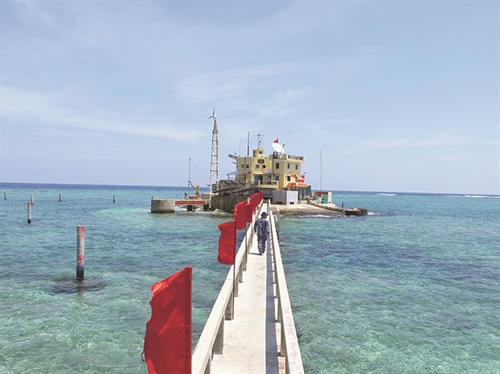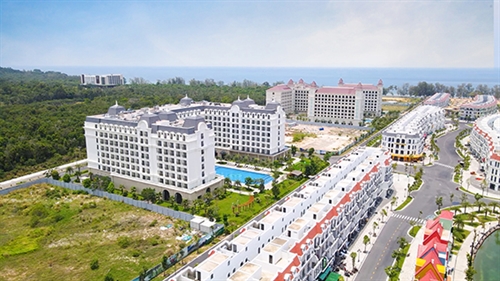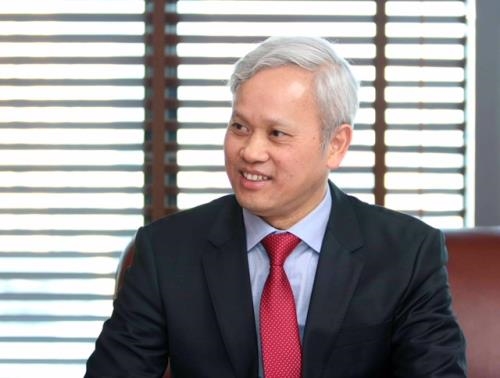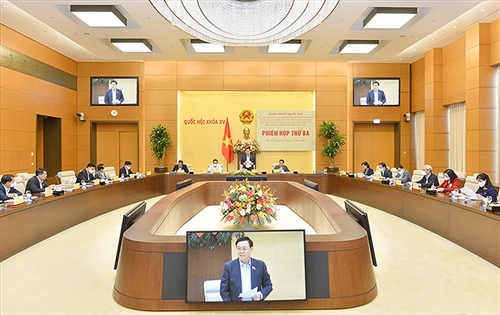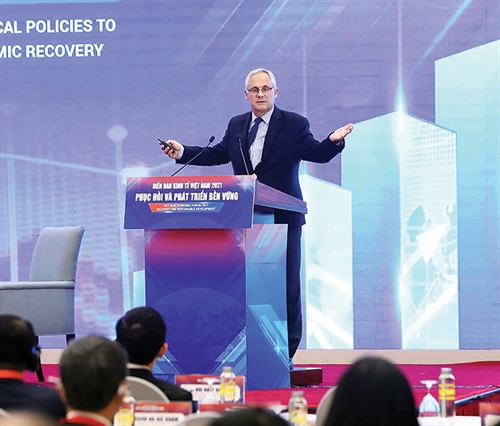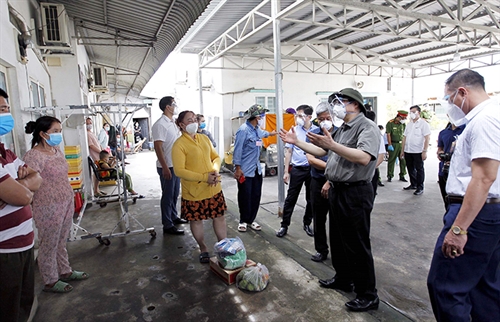Over the past time, Vietnam’s legal system on intellectual property (IP) has been built and regularly revised, forming a fundamental legal foundation to regulate issues related to intellectual property rights (IPRs) protection and enforcement. Today, in the face of the requirements of an increasingly intensive, extensive and comprehensive international integration process, it needs further improvements to ensure effective implementation of international commitments and promote the application of scientific and technological research outcomes to production and business, contributing to the national socio-economic development.
Dr. Dinh Huu Phi
Director of the IP office of Vietnam- Ministry of Science and Technology
The Law on Intellectual Property was passed by the National Assembly in 2005 and took effect on July 1, 2006, and then revised twice in 2009 and in 2019 (the Law), containing uniform, synchronous and transparent provisions to regulate IP issues. Its promulgation was an important landmark in the process of building, developing and perfecting the IP law in the country, exerting a positive impact on promoting and supporting creative activities, exploitation and protection of intellectual assets, encouraging fair competition, and increasing attractiveness of the Vietnamese market to foreign entities. Its provisions ensure the principle of balance of interests between individuals (owners) and the public (society), creating a strong momentum to the development of creative research, production and business towards the goal of socio-economic development, contributing to improving the people’s material and spiritual lives.
The Law has formed a legal corridor, contributing to step by step promoting activities of investment, trading, exploitation, capital contribution, joint venture, association, transfer and assignment of intellectual assets. It provides state authorities with a firm legal basis to recognize and protect the legitimate rights and interests of parties when resolving disputes or infringements in the IP field.
Regarding the process of international integration, the Law focuses on taking advantage of flexibilities that international commitments allow, such as setting restrictive conditions and measures against abuse of IPRs, applying parallel import, compulsory licensing, etc. Therefore, it has truly become an important legal tool in ensuring the national interests in the integration process and, at the same time, respecting treaties on IP to which Vietnam is a signatory.
Currently, the Law basically conforms to the standards set forth by the Agreement on Trade-Related Aspects of Intellectual Property Rights (TRIPS Agreement) and other fundamental treaties relating to IP, such as the Paris Convention for the Protection of Industrial Property Rights, the Berne Convention for the Protection of Literary and Artistic Works, the Convention for the Protection of New Plant Varieties. Those standards are demonstrated in many aspects, such as types of objects of protection, standards of protection, content and scope of rights, term of protection, protection mechanism and procedures for establishing IPRs.
In the free trade agreements (FTAs) that were signed and took effect before 2016, such as those between Vietnam and Chile, Republic of Korea, the Eurasian Economic Union, among others, most of the IP obligations that Vietnam has committed to make reference to the obligations set out in the TRIPS Agreement. Only a few agreements have specific obligations which are higher or more detailed than those under the TRIPS Agreement, but their provisions are either consistent with Vietnam’s current IP legal system or mainly non-compulsory, requiring only the parties’ efforts to implement.
 |
| Do Trong Minh Duc (far right), Tran Nguyen Khanh An (middle) and Nguyen Hoang Phuc (left), three Vietnamese young inventors who are selected as the IP Youth Ambassadors for Vietnam, and their innovation, an anti-COVID VIHELM__Photo: https://www.wipo.int/ |
Nevertheless, after more than 15 years of implementation, the Law has revealed certain shortcomings and limitations.
Firstly, its provisions on copyright holders, performers and related rights holders in cases of transfer of ownership rights, transfer of use rights in copyright and related rights transfer contracts remain inadequate.
Secondly, the current provisions have not yet created incentives to encourage organizations and individuals that directly create, exploit and disseminate inventions, industrial designs or layout designs to participate in the process of establishing, exploiting and transferring technologies, thus leading to limited commercialization of inventions, industrial designs and layout designs.
Thirdly, the provisions on procedures for registration of copyright and related rights and establishment of industrial property rights remain unclear and incomplete. As for the procedures for registration of copyright and related rights, there are no provisions on the composition of the dossier for online registration and the responsibilities of organizations and individuals carrying out the procedures. Regarding the procedures for registration of the establishment of industrial property rights, a number of provisions are complicated and unreasonable, leading to delays in the examination of applications for establishment of industrial property rights.
Fourthly, the Law fails to ensure an adequate and balanced level of protection in the protection of IPRs.
In the field of copyright and related rights, the Law, on the one hand, stipulates cases of using published works without having to ask for permission or to pay royalties and remunerations but, on the other hand, does not address cases of exploitation and use of these works at the library. In addition, it also fails to clearly stipulate the use of published works, especially musical works, in the form of phonograms and video recordings for commercial purposes in cases permission for use of work is not required but royalties and remuneration must be paid.
With regard to industrial property rights, many issues arising from enforcement practice need to be addressed in order to ensure an adequate and balanced level of protection, such as the principle of assessing the novelty of inventions; cases in which invalidation of invention and utility solution patents may be needed; dealing with cases of trademark registration with malicious intent, etc. Besides, there are a number of issues only mentioned in principle in the Law or only detailed in decrees or circulars, causing problems to the uniform application of the law.
In the field of plant varieties, the provisions on exceptions to the rights to plant varieties under the Law are still broad. This will greatly affect the authors’ legitimate interests and, at the same time, cause difficulties in ensuring compliance with international commitments.
Fifthly, IP support activities remain limited. Current provisions on collective representative organizations of copyright and related rights are neither consistent with the Civil Code’ provisions on representation nor conformable with international practices. In addition, the Law fails to clearly define the rights and responsibilities of collective representative organizations of copyright and related rights.
Sixthly, IPRs enforcement or protection is not really effective. The widening of the scope of application of administrative enforcement measures to IPRs infringements has created an unnecessary burden on the state budget. Besides, the provisions on enforcing rights in a digital environment or on handling domain names that violate the IP law are vast and unclear, making it difficult for enforcement agencies to handle these violations.
Worthy of note, the commitments on IP in recent new-generation FTAs, for example, the European Union-Vietnam FTA (EVFTA), the Comprehensive and Progressive Agreement for Trans-Pacific Partnership (CPTPP), the Regional Comprehensive Economic Partnership (RCEP), require a higher level of openness and deal with a diverse range of issues, in which IPRs protection is greatly enhanced compared to the TRIPS Agreement. A raft of high standards for IPRs protection and enforcement established by new-generation FTAs prompt revision to the Law, such as its provisions on protection of audio marks, protection of test data of agrochemical products, the competence to proactively apply control measures at the border, the mechanism to compensate patent owners for the delay in the licensing procedure for market circulation of pharmaceutical products manufactured under the patents, among others.
In addition, Vietnam’s recent accession to a number of treaties, such as the Hague Agreement on the International Registration of Industrial Designs and the Budapest Treaty on Deposit of Microorganisms, also requires changes in a number of regulations guiding the provisions of the Law’s provisions on procedures for establishing IPRs.
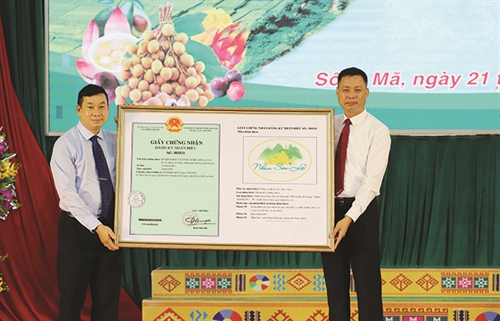 |
| A representative of the IP Office of Vietnam (left) awards the decision on grant of the certificate of trademark registration for “Son La Longan” to the leadership of Son La province People’s Committee__Photo: Quang Quyet/VNA |
| A representative of the IP Office of Vietnam (left) awards the decision on grant of the certificate of trademark registration for “Son La Longan” to the leadership of Son La province People’s Committee__Photo: Quang Quyet/VNA |
Orientations for revision of the Law
In response to the requirements of the new context, Resolution 11-NQ/TW, dated June 3, 2017, of the 5th Plenum of the 12th Central Committee of the Communist Party of Vietnam (CPV) on “perfecting the socialist-oriented market economy institution” set out the task of improving the institutions on IP in the direction of encouraging creativity, ensuring transparency and high reliability and effectively protecting and enforcing IPRs.
Government Resolution 38 dated April 25. 2017, also stressed the task of reviewing, supplementing and improving legal documents to ensure compatibility between Vietnam’s current legal provisions and new-generation FTAs, especially those on IP.
CPV’s Politburo Resolution 52-NQ/TW, dated September 27, 2019, on “a number of undertakings and policies to actively participate in the Fourth Industrial Revolution” clearly defines the requirements to complete IP law, effectively and reasonably protect and exploit intellectual assets created by Vietnam, and encourage commercialization and transfer of IPRs, especially inventions in Vietnam, on the basis of compliance with domestic laws and assurance of national security interests. The Resolution also sets a specific goal by 2030 for Vietnam to maintain its ranking on the Global Innovation Index (GII) in the group of top three ASEAN countries[1].
The Resolution of the 13th National Congress of the CPV identifies one of the key tasks as perfecting the legal system, especially the law on IP protection and strengthening IPRs protection and enforcement.
Therefore, it is necessary to amend and supplement a number of articles of the Law in order to institutionalize the guidelines and lines of the Party, policies and laws of the State on perfecting the institutions on IP, overcome obstacles and inadequacies in the practical implementation of the Law as well as conflicts between the provisions of the Law and other laws promulgated by the National Assembly; institutionalize and incorporate into national laws commitments in conformity with international practices; perfecting the institutions on IP in the direction of encouraging organizations and individuals to create and invest in research, development, transfer and effective application of scientific and technological achievements in all fields of social life; ensuring the stability, consistency, synchrony, transparency and feasibility; effectively protecting and enforcing IPRs; at the same time, improving the effectiveness and efficiency of state management of IP, contributing to promoting socio-economic development.
The issues in the current Law that need to be revised can be categorized into seven major policy groups as follows:
Policy 1: Ensuring clear provisions on authors, copyright holders, performers, and related rights holders in cases of assignment and transfer of copyright and related rights
Concretely, the regulations relating to the identification of property rights holders (owners, authors and performers) should be further specified and clarified, helping to facilitate the transfer of ownership and use right in the contracts on assignment or transfer of copyright and related rights. The regulations on grant of permission for the transfer of some moral rights by agreement (agreement on naming and modification of works) should be revised to suit the characteristics of copyright in order to solve problems that have arisen over the past time, such as those in cases when it is needed to change the names of works, to modify or upgrade computer programs, etc.
Policy 2: Encouraging the creation, exploitation and dissemination of inventions, industrial designs and layout designs generated with state budget funds
The Government proposes the grant of the right to register inventions, industrial designs or layout designs created with state budget funds automatically and without compensation to the organizations which directly manage the creation of these objects as prescribed in the Law (and enjoy ownership when they are granted protection titles). At the same time, regulations should be added to ensure that the State can still exert control to maintain the effective exploitation and balance the interests of these organization (protection title holders) and the interests of the State in the capacity as “the investor” and public interests.
Policy 3: Facilitating the performance of procedures for registration of copyright and related rights and establishment of industrial property rights in the direction of simplicity, compactness, speediness, convenience and transparency
Some specific amendments include: creating a legal basis for organizations and individuals to register online for copyright and related rights; classifying third-party opinions to speed up the application examination process; simplifying the industrial design description; limiting security control on inventions; allowing delay of publication of industrial designs; and adding a number of specific provisions on complaint settlement procedures in the field of industrial property.
Policy 4: Ensuring an adequate and balanced level of IPRs protection
To this end, some exceptions that do not infringe copyright or related rights and limitations of copyright and related rights should be added in order to ensure the harmony of interests among copyright holders, work exploiters and users, and the public, ensuring the implementation of Vietnam’s international commitments and conformity with the country’s practical conditions.
In addition, it is necessary to add some regulations to control inventions using genetic resources and traditional knowledge about genetic resources while supplementing grounds for invalidation or cancellation of protection titles (inventions and trademarks) and settlement of conflicts between trademarks and plant variety names as well as subjects of copyright and related rights. At the same time, regulations on subjects for geographical indications should be revised, clarifying cases considered unfair competition between domain names and pre-existing trademarks, trade names or geographical indications.
Policy 5: Raising the effectiveness of IP support activities
Changes to promote support activities for the IP system (including representation and assessment activities) include: classifying the scope of industrial property representation activities in more detail, at the same time, removing inappropriate business conditions to match the reform of administrative procedures; clearly defining the scope of IP assessment and judicial expertise, principles of undertaking assessment and the value of assessment conclusions.
Policy 6: Improving the effectiveness of IPRs protection activities
Regulations relating to the enforcement of rights should be revised to ensure that the IPRs protection mechanism is more effective, reasonable and feasible. Notably, they include proposals to narrow the scope of administrative sanctioning in the direction of handling only by administrative measures infringements upon rights over the five objects of copyright, related rights, trademarks, geographical indications and plant varieties; granting customs authorities the power to proactively apply control measures at the border if, in the course of inspection, supervision and control, discovering clear grounds to suspect that imported or exported goods are fake.
Policy 7: Ensuring full and serious implementation of Vietnam’s international commitments on IP protection in the process of international integration
In light of this, it is necessary to revise a number of contents related to technological measures to protect rights and information on management of rights to ensure enforcement in the digital environment; exceptions to copyright and related rights; protection of sound trademarks; invalidation of the protection titles of marks; mechanism to ensure information for patent holders to exercise their rights in carrying out procedures for licensing the market circulation of pharmaceutical products; the obligation to protect confidential data in agrochemical license applications; rights and responsibilities of enterprises providing intermediary services in the Internet and telecommunications networks; the obligation to proactively suspend customs procedures with regard to imported or exported goods suspected of being counterfeit, etc.
Not only the Law but also its guiding decrees and circulars in each field or on each issue also need to be further amended so that they can be applied immediately after the Law’s amendments come into force. In addition, a number of provisions of these guiding texts also need to be revised to conform with treaties which Vietnam has recently acceded to. Only in such way can a synchronous and highly feasible legal system be created to help solve problems and inadequacies in practice and effectively implement treaties in conformity with Vietnam’s current development level.-
[1] Out of a total of 80 criteria constituting GII, eight criteria are directly related to IP.
